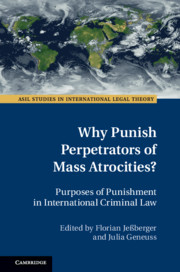Book contents
- Why Punish Perpetrators of Mass Atrocities?
- ASIL Studies in International Legal Theory
- Why Punish Perpetrators of Mass Atrocities?
- Copyright page
- Contents
- Contributors
- Preface
- Abbreviations
- 1 Introduction: The Need for a Robust and Consistent Theory of International Punishment
- 2 The Practical Importance of Theories of Punishment in International Criminal Law
- Part I Setting the Framework: Criminological, Historical and Domestic Perspectives
- Part II Rationales for Punishment in International Criminal Law: Theoretical Perspectives
- Part III Consequences for the Practice of the International Criminal Court
- 16 Prosecution Strategy at the International Criminal Court in Search of a Theory
- 17 Selectivity in International Criminal Law
- 18 Theories of Punishment in Sentencing Decisions of the International Criminal Court
- 19 Theories of Punishment at The Hague
- 20 From Punitive to Restorative Justice
- 21 Concluding Remarks
- Select Bibliography
- Index
21 - Concluding Remarks
Dimensions of ‘Why Punish?’
from Part III - Consequences for the Practice of the International Criminal Court
Published online by Cambridge University Press: 07 February 2020
- Why Punish Perpetrators of Mass Atrocities?
- ASIL Studies in International Legal Theory
- Why Punish Perpetrators of Mass Atrocities?
- Copyright page
- Contents
- Contributors
- Preface
- Abbreviations
- 1 Introduction: The Need for a Robust and Consistent Theory of International Punishment
- 2 The Practical Importance of Theories of Punishment in International Criminal Law
- Part I Setting the Framework: Criminological, Historical and Domestic Perspectives
- Part II Rationales for Punishment in International Criminal Law: Theoretical Perspectives
- Part III Consequences for the Practice of the International Criminal Court
- 16 Prosecution Strategy at the International Criminal Court in Search of a Theory
- 17 Selectivity in International Criminal Law
- 18 Theories of Punishment in Sentencing Decisions of the International Criminal Court
- 19 Theories of Punishment at The Hague
- 20 From Punitive to Restorative Justice
- 21 Concluding Remarks
- Select Bibliography
- Index
Summary
Since Nuremberg, international punishment for mass atrocities is pervasive, as an idea and as a practice. In fact, many observers regard the institutionalization of international punishment – i.e., the incarceration of perpetrators of genocide, crimes against humanity and war crimes – as a progress and as a promise: The international community, by and large, seems to have, at least rhetorically, agreed that criminal punishment rather than impunity or, e.g., summary executions, is the adequate reaction to mass atrocities.
- Type
- Chapter
- Information
- Why Punish Perpetrators of Mass Atrocities?Purposes of Punishment in International Criminal Law, pp. 380 - 386Publisher: Cambridge University PressPrint publication year: 2020

